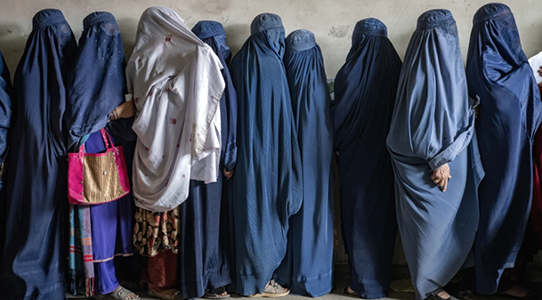||| FROM ASSOCIATED PRESS |||
ISLAMABAD (AP) — The Taliban on Monday rejected concerns and criticism raised by the United Nations over new vice and virtue laws that ban women in Afghanistan from baring their faces and speaking in public places.
Roza Otunbayeva, who heads the U.N. mission in the country, UNAMA, said Sunday that the laws provided a “distressing vision” for Afghanistan’s future. She said the laws extend the “ already intolerable restrictions ” on the rights of women and girls, with “even the sound of a female voice” outside the home apparently deemed a moral violation.
Zabihullah Mujahid, the main spokesman for the Taliban’s government, issued a statement warning against “arrogance” from those who he said may not be familiar with Islamic law, particularly non-Muslims who might express reservations or objections.
“We urge a thorough understanding of these laws and a respectful acknowledgment of Islamic values. To reject these laws without such understanding is, in our view, an expression of arrogance,” he said.
Afghanistan’s Taliban rulers on Wednesday issued the country’s first set of laws to discourage vice and promote virtue. They include a requirement for a woman to conceal her face, body and voice outside the home. They also ban images of living beings, such as photographs.
**If you are reading theOrcasonian for free, thank your fellow islanders. If you would like to support theOrcasonian CLICK HERE to set your modestly-priced, voluntary subscription. Otherwise, no worries; we’re happy to share with you.**









If you think religious totalitarianism can’t happen here, I hope you are correct, but I fear you are mistaken. SIX of the nine Supreme Court justices are Catholic. FIVE of them are clearly Opus Dei connected. The highest court in the land is not just politicized; it is weaponized against liberalism, against individual rights and against separation of church and state. The women of Afghanistan are living the Islamic version of that totalitarian nightmare right now. But a few decades ago it was completely different:
https://www.messynessychic.com/2013/06/10/lost-in-time-groovy-afghanistan/
Compare the photographs in this article to the ones in the article above and remember that we are NOT exceptional; we are just like every other bunch of human beings on the planet and if we don’t pay attention when our rights and freedoms are being stolen from us one by one, we will wake up with the American Taliban dictating to us.
It CAN happen here. But only if we let it.